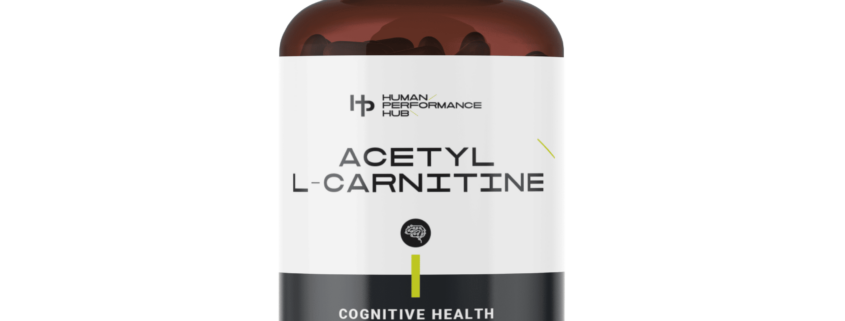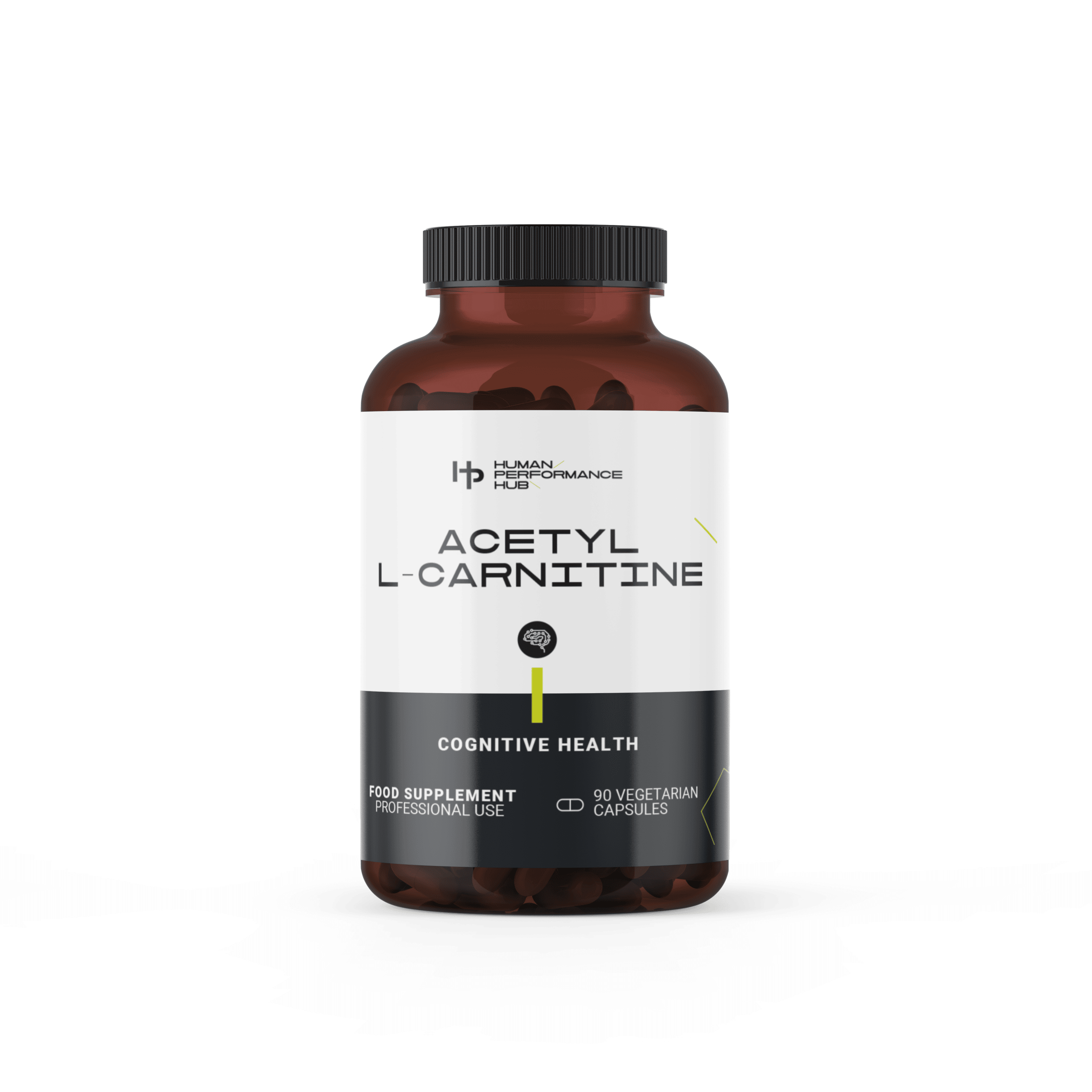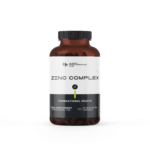The Brain Energiser and Revitaliser
Acetyl-L-carnitine is a powerful amino acid that amps up your brain function. Read on to learn more about the many benefits of acetyl-L-carnitine and how the exclusive formula of Human Performance Hub Acetyl-L-Carnitine can help improve your health.
What is Acetyl-L-Carnitine?
Acetyl-L-carnitine is an amino acid found in nearly all cells of your body. A natural component of the brain’s chemistry, acetyl-L-carnitine is essential for brain and cognitive health.
One of the most extensively researched brain nutrients, acetyl L-carnitine has a proven ability to enhance mental energy and wellness.
That’s because it increases levels of essential neurotransmitter chemicals needed for alertness, memory, focus, and learning. Additionally, it provides energy to the brain and repairs damage to brain cells by stress and poor nutrition.
Sources of acetyl-L-carnitine
The only food source for this nutrient is an animal brain (not a recommended food source). Supplemental acetyl-L-carnitine is synthetically derived from other amino acids and is suitable for vegetarians.
Your body makes acetyl-L-carnitine naturally in small amounts, but levels decline as you age. For optimal brain function, supplementing with acetyl l-carnitine is highly beneficial.
You may also want to consider acetyl-L-carnitine supplementation if you have mental fatigue, depression, short attention span, decreased memory and learning ability. These symptoms can signal inadequate levels of acetyl-L-carnitine in your body.
Supplementing with Acetyl-L-Carnitine
Human Performance Hub Acetyl-L-Carnitine provides 800 mg of this valuable nutrient per capsule. Cofactor nutrients include phosphatidylserine, B vitamins, lipoic acid, phosphatidylcholine, and EPA/DHA, increasing acetyl-L-carnitine’s effectiveness.
When do you start feeling the benefits of acetyl-L-carnitine?
You may feel the benefits of acetyl-L-carnitine very quickly. You may notice an increase in mental energy and focus within twenty minutes. For this reason, it should not be taken late in the day as it may delay falling asleep.
Are there any side effects to taking acetyl-L-carnitine?
Long term, there are no side effects. There are only benefits because acetyl-L-carnitine protects and helps to regenerate the brain. Acetyl-L-carnitine is not a stimulant. It is a nutrient that naturally increases the energy of the brain to provide many related benefits.
Benefits of Acetyl-L-Carnitine
Improves memory and cognition
Acetyl-L-carnitine supports neuroplasticity and reduces brain inflammation. It increases acetylcholine levels in the brain, a neurotransmitter crucial for learning and memory. [1]
Studies show that acetyl-L-carnitine plays a vital role in slowing or preventing age-related decline in mental functions. [2] For example, significant increases in cognitive functioning, memory performance, and constructional thinking appeared in 236 older adults taking 1.5 g/day of acetyl-L-carnitine for forty-five days. [3] And twenty adults given 1.5 g of acetyl L-carnitine experienced a reversal of many signs of brain ageing. [3]
Alcoholics with cognitive impairment have also benefited from acetyl L-carnitine supplementation. [4]
Relieves depression
Acetyl L-carnitine is one of the most valuable compounds for relieving depression naturally. [6,7] It does so by increasing the energy of brain cells. Energy allows brain cells to communicate better, and a social brain is a happier brain.
Acetyl L-carnitine also increases compounds such as acetylcholine, which is essential for healthy mood levels. A review of human, animal and cellular models suggests acetyl L-carnitine effectively improves depressive symptoms and supports neuroplasticity. [6]
A meta-analysis indicates acetyl L-carnitine supplementation significantly decreased depressives symptoms than placebo or no intervention and has fewer side effects than antidepressant medications. [7]
Speeds stroke recovery
Acetyl-L-carnitine shows promising results for accelerating recovery in stroke patients.
One important study involved 160 patients who suffered strokes at least one year before receiving supplementation. These patients were given 1.5 g of acetyl-L-carnitine per day for eight weeks, leading to increased recovery speed and improved mood and attention span. [8]
Slows the progression of Alzheimer’s disease
Alzheimer’s disease is linked with acetylcholine irregularities, showing this neurotransmitter’s important for brain function.
Over twenty years, a study of 600 patients with Alzheimer’s confirmed that acetyl-L-carnitine benefits Alzheimer’s patients. [9-11]. Controlled trials showed dramatically less mental deterioration in thirty Alzheimer patients taking acetyl-L-carnitine supplementation [12]. And a one-year treatment with acetyl-L-carnitine in 130 patients with Alzheimer’s led to a slower rate of mental decline in 13 of the 14 outcome measures. [13]
Acetyl-L-carnitine may also help manage Parkinson’s disease. Its use in animal studies shows acetyl-L-carnitine improves age-related memory and learning impairments by activating synaptic function and reducing cognitive deficits. [14, 15]
It helps damaged nerves and diabetic neuropathy.
Acetyl-L-carnitine speeds nerve healing and prevents loss of nerve function and is recommended when physical injury to neurons occurs, including brain injuries from car accidents and other causes. [16,17] Brain injury patients report that acetyl-L-carnitine, especially when combined with phosphatidylserine, significantly improved overall brain function, attention span, and learning ability.
Multiple studies show acetyl L-carnitine benefits for peripheral nerve disease, improved nerve conduction velocity, and nerve regeneration. [18]
Acetyl L-carnitine has also been found to be helpful in the management of diabetic neuropathy [17]. For example, 117 patients with diabetic neuropathy safely and effectively improved their symptoms by taking 500 mg of acetyl-L-carnitine three times per day for 24 weeks. [19]
Enhances immune function
Acetyl-L-carnitine is a powerful immune enhancer. This is due to its ability to promote the health of the nervous system, which governs the activity of the immune system.
The antioxidant effects of acetyl-L-carnitine help prevent free radicals and toxins from causing brain damage and fortify the mitochondria’s defences.
Acetyl-L-carnitine may also offer specific benefits to HIV patients [20,21] and those with tuberculosis. [22]
Improves female reproductive function
Studies of acetyl-L-carnitine supplementation show promising results for improving female fertility and reproductive status.
Several human and animal studies showed more energy generated in the mitochondria, less oxidative stress, and a reduced rate of apoptosis (which promotes oocyte growth and maturation).
Dosages in human trials ranged from 250 mg to 3000 mg daily. When combined with vitamin C, acetyl-L-carnitine helps to enhance antioxidant function. [22]
Recommended use
Take one capsule per day or as directed by your health care practitioner. Acetyl-L-Carnitine is energising, so it’s best to take it no later than 4:00 p.m.
Suggested dosages for certain conditions:
- To increase mental energy: 700-2,000 mg
- To relieve depression: 700-2,000 mg
- To enhance immune system: 700-2,000 mg
- To support brain injuries/stroke: 1,400-3,000 mg
- To support Alzheimer’s disease: 2,000-3,000 mg
Contraindications
L- carnitine is not recommended for people with epilepsy or manic depression.
Consultations
We’re always here to help. If you have any questions or would like advice on nutrition, supplements or training, please book in for a consultation.
Further reading
- Supplementation: The benefits of L-carnitine
- Acetyl L-Carnitine
- Carnitine Complex
- 5 top reasons why taking a multivitamin supplement is smart health insurance
References
- Ferreira, G. C., & McKenna, M. C. (2017). L-Carnitine and Acetyl-L-carnitine Roles and Neuroprotection in Developing Brain. Neurochemical Research, 42(6), 1661–1675. Dowson JH, Wilton-Cox H, Cairns MR, Ramacci MT. The morphology of lipopigment in rat Purkinje neurons after chronic acetyl-L-carnitine administration: a reduction in ageing-related changes. Biol Psychiatry 1992; 32:179-87.
- Cipolli C, Chiari G. [Effects of L-acetylcarnitine on mental deterioration in the aged: initial results].
- Guarnaschelli C, Fugazza G, Pistarini C. Pathological brain ageing: evaluation of the efficacy of a pharmacological aid. Drugs
- Tempesta E, Troncon R, Janiri L, et al. Role of acetyl-L-carnitine in the treatment of cognitive deficit in chronic alcoholism. Int J Clin Pharmacol
- https://www.ncbi.nlm.nih.gov/pmc/articles/PMC5621476/
- Wang, S.-M., Han, C., Lee, S.-J., Patkar, A. A., Masand, P. S., & Pae, C.-U. (2014). A review of current evidence for acetyl-l-carnitine in the treatment of depression. Journal of Psychiatric Research, 53, 30–37.
- Veronese, N., Stubbs, B., Solmi, M., Ajnakina, O., Carvalho, A. F., & Maggi, S. (2018). Acetyl-L-Carnitine Supplementation and the Treatment of Depressive Symptoms. Psychosomatic Medicine, 80(2), 154–159. doi:10.1097/psy.0000000000000537
- Patti F, Marano P, Cappello S. Effects of L-Acetylcarnitine on functional recovery of hemiplegic patients.
- Brooks JO, 3rd, Yesavage JA, Carta A, Bravi D. Acetyl L-carnitine slows decline in younger patients with Alzheimer’s disease: a reanalysis of a double-blind, placebo-controlled study using the trilinear approach.
- Rai G, Wright G, Scott L, Beston B, Rest J, Exton-Smith AN. Double-blind, placebo-controlled study of acetyl-l-carnitine in patients with Alzheimer’s dementia.
- Thal LJ, Carta A, Clarke WR, et al. A 1-year multicenter placebo-controlled study of acetyl-L-carnitine in patients with Alzheimer’s disease.
- Sano M, Bell K, Cote L, et al. Double-blind parallel design pilot study of acetyl levocarnitine in patients with Alzheimer’s disease.
- Spagnoli A, Lucca U, Menasce G, et al. Long-term acetyl-L-carnitine treatment in Alzheimer’s disease.
- Puca FM, Genco S, Specchio LM, et al. Clinical pharmacodynamics of acetyl-L-carnitine in patients with Parkinson’s disease.
- Kobayashi, S., Iwamoto, M., Kon, K., Waki, H., Ando, S., & Tanaka, Y. (2010). Acetyl-l-carnitine improves aged brain function. Geriatrics & Gerontology International, 10, S99–S106. doi:10.1111/j.1447- 0594.2010.00595.x
- De Angelis C, Scarfo C, Falcinelli M, et al. Acetyl-L-carnitine prevents age-dependent structural alterations in rat peripheral nerves and promotes regeneration following sciatic nerve injury in young and senescent rats.
- De Angelis C, Scarfo C, Falcinelli M, Reda E, Ramacci MT, Angelucci L. Levocarnitine acetyl stimulates peripheral nerve regeneration and neuromuscular junction remodelling following sciatic nerve injury.
- Sergi, G., Pizzato, S., Piovesan, F., Trevisan, C., Veronese, N., & Manzato, E. (2017). Effects of acetyl-L-Carnitine in diabetic neuropathy and other geriatric disorders. Aging Clinical and Experimental Research, 30(2), 133–138. doi:10.1007/s40520-017-0770-3
- Li, S., Chen, X., Li, Q., Du, J., Liu, Z., Peng, Y., … Tian, H. (2016). Effects of acetyl-L-carnitine and methylcobalamin for diabetic peripheral neuropathy: A multicenter, randomised, double-blind, controlled trial. Journal of diabetes investigation, 7(5), 777–785. doi:10.1111/jdi.12493
- Famularo G, Moretti S, Marcellini S, et al. Acetyl-carnitine deficiency in AIDS patients with neurotoxicity on treatment with antiretroviral nucleoside analogues.
- Scarpini E, Sacilotto G, Baron P, Cusini M, Scarlato G. Effect of acetyl-L-carnitine in the treatment of painful peripheral neuropathies in HIV+ patients.
- Agarwal A, Sengupta P, Durairajanayagam D. Role of L-carnitine in female infertility. Reprod Biol Endocrinol. 2018 Jan 26;16(1):5. PubMed PMID: 29373970; PubMed Central PMCID: PMC5785901. https://www.ncbi.nlm.nih.gov/pmc/articles/PMC5785901/
- Jirillo E, Altamura M, Munno I, et al. Effects of acetyl-L-carnitine oral administration on lymphocyte antibacterial activity and TNF-alpha levels in patients with active pulmonary tuberculosis. A randomised double-blind versus placebo study. Immunopharmacol Immunotoxicol.
- Singh, S., Mishra, A., Srivastava, N., Shukla, R., & Shukla, S. (2016). Acetyl-l-Carnitine via Upregulating Dopamine D1 Receptor and Attenuating Microglial Activation Prevents Neuronal Loss and Improves Memory Functions in Parkinsonian Rats. Molecular Neurobiology, https://www.ncbi.nlm.nih.gov/pubmed/27975173 25. Evans, J. D., Jacobs, T. F., & Evans, E. W. (2008). Role of Acetyl-L-Carnitine in the Treatment of Diabetic Peripheral Neuropathy. Annals of Pharmacotherapy






